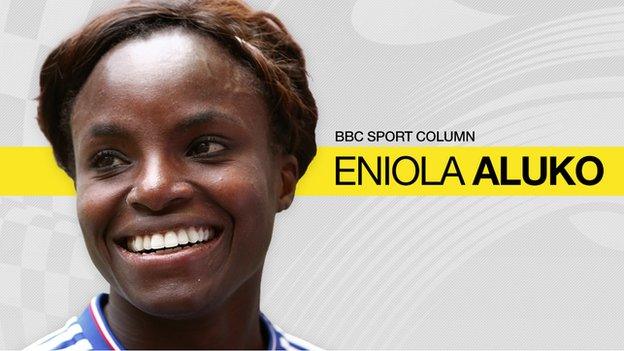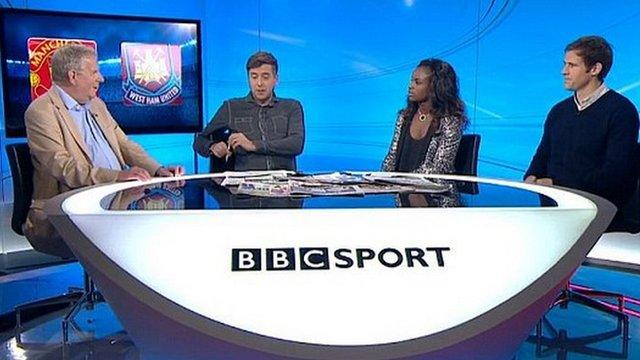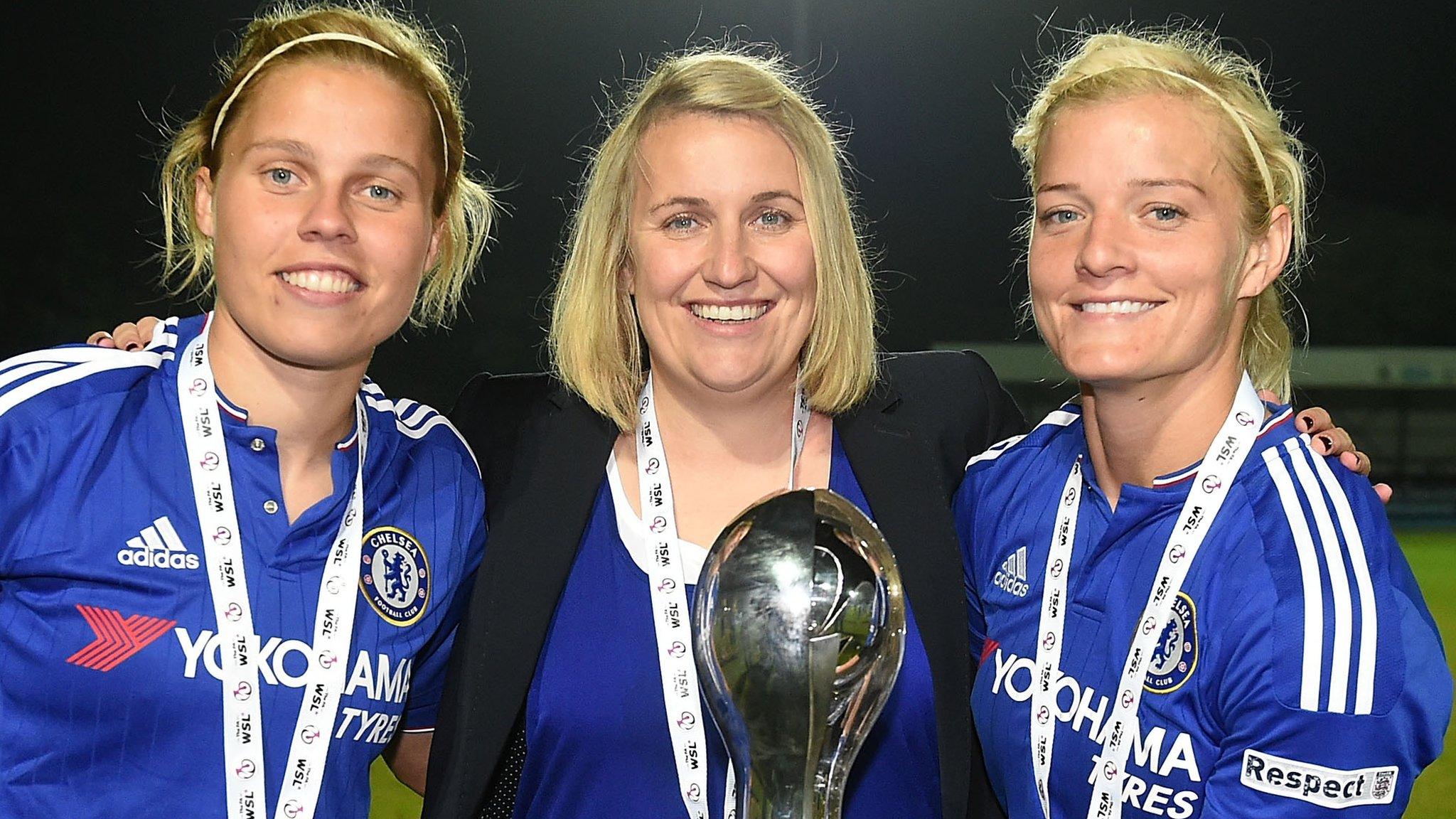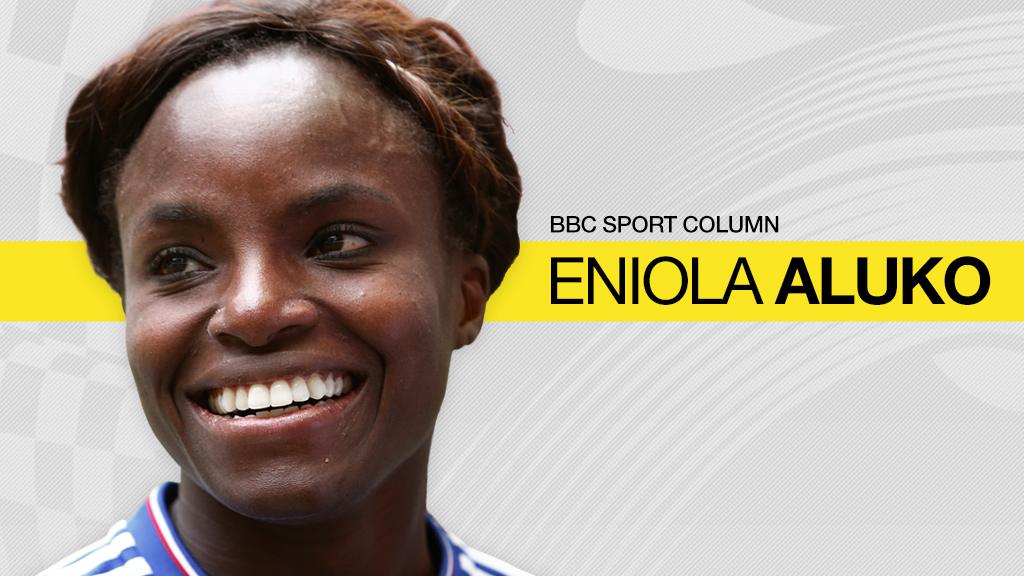Eniola Aluko on why winter move is good for WSL and being a men's football pundit
- Published

At the start of the season, I wrote a column about how the poor scheduling of the Women's Super League was confusing for fans, so I'm pleased the Football Association has addressed this by switching to a winter competition.
Moving to a summer league back in 2011 was a good decision in order to grow a fan base, and welcoming regular crowds of more than 1,000 people, it feels like we have done that.
But we have already seen huge gaps in the fixtures this season, and irregular scheduling could spoil all the good work done in growing the game to this stage.
Now we will hopefully see more consistency, and I actually think it opens up some exciting marketing opportunities to boost women's football even further.
Clubs could begin to merge their men's and women's operations to a greater degree by hosting games on the same weekend or even the same day.
Why not play a women's WSL game at Stamford Bridge or Emirates Stadium before the men kick off their Premier League match? Or create ticket price incentives for fans that involve going to a men's and women's game for a reduced price than a normal ticket? That could lead to some really big attendances and would be fantastic for the players too.
I also think the move will be good for the competitiveness of WSL teams and, in turn, England.
The Women's Champions League is still run on a winter schedule so when we played Wolfsburg in the competition last November, not only had we completed a full season, but we hadn't played for a month.
We were out of season, and if English teams wanted to succeed in Europe, we had to do something to align us with our competitors, who also play their domestic leagues in winter.
Performing well in the Champions League will have a knock-on effect with the England team. The best international players from Europe all have years of experience in the continent's elite club competition and we need to bridge that gap if we want to win major tournaments.
From a European perspective, Chelsea have been encouraging a winter move, but overall it makes sense and I applaud the FA for taking the criticism and recommendations about this season on board.
Women qualified to talk about men's football

In September 2014, Aluko became the first female pundit to appear on Match of the Day
We are already seeing a greater collaboration between men's and women's football, and the media seems to be adopting this with increasing frequency.
In September 2014, I became the first female pundit to appear on Match of Day, and recently worked as a TV pundit during Euro 2016, so it shows you I'm not alone in thinking women are more than qualified to talk about men's football.
During the Euros, I wasn't sure what to expect from working on an exclusively male panel for a major tournament, but I had some great feedback from my fellow pundits and fans.
Initially, I think there were a few of my colleagues who were surprised I was there, and didn't really know who I was.
Former Arsenal and France midfielder Emmanuel Petit admitted he didn't know much about women's football, but after we had spoken about his time at Chelsea and he heard some my opinions about the game, he recognised I knew what I was talking about.
I also spoke a lot to West Ham boss Slaven Bilic, who, like me, studied law when he was younger.
It doesn't matter if you're talking law or football; all you want is for people to judge you on your professional opinion first, rather than as a woman.
I'm not the only one, of course. Doncaster's Sue Smith, Arsenal's Alex Scott and Casey Stoney plus former Everton goalkeeper Rachel Brown-Finnis have all appeared on TV talking about men's football, but we have all played the game at major tournaments for England, so our sex is irrelevant.
Hopefully by breaking new ground, it won't seem like such a big deal for other players to be hired in the same way, and it won't be too long before women appear on football shows on a weekly basis.
Euro 2016 was enjoyable, except for the final
Various pundits have said the European Championship lacked quality but I thought it was a great tournament in terms of parity of results, upsets, and the likes of Wales reaching the semi-finals unexpectedly.
Some have said increasing the tournament to 24 teams diluted the standard, but I don't think that was the case. Many games were decided in the last 10 minutes which suggests they were close.
Admittedly, no team was outstanding. France and Germany looked good from the start but still had weaknesses and I think that added to the excitement; there was no way of predicting what would happen. Antonio Conte's Italy looked the most exciting team for me but Germany, as England have often experienced, unfortunately knocked them out on penalties.
The only issue I had was that most of the strong teams appeared on one side of the draw.
It seemed strange that Italy, Spain, Germany and France were all on one side and the likes of Portugal and Wales were on the other. That made it easier for them to get to the final, so it felt like Portugal, who won only one game in 90 minutes, had an easier ride.
Lots of people also complained that allowing a third-placed team to reach the second round was wrong, but Portugal won it from that position and look at what we got from the Republic of Ireland and Northern Ireland: arguably two of the best sets of fans in the tournament.
Elsewhere, Iceland beat England and provided one of the stories of the championship. And where would we be without the thunderclap?
After such a good tournament, I think the final was a huge anti-climax. The French players looked exhausted in the second half, with the advantage of Portugal having one more day of rest proving the difference. Surely for a final both teams should've had equal days' rest? It would have been great for France to win, for lots of reasons, but they didn't have enough when it mattered the most which I am sure they will regret for many years to come.
Still, at least we got to witness Cristiano Ronaldo as an injured assistant coach. That was hilarious. It couldn't have been any more about him!
Iceland captain Aron Gunnarsson leads fans in celebrating the victory over England
England and Chelsea forward Eniola Aluko was speaking to BBC Sport's Alistair Magowan
- Published12 July 2016

- Published22 March 2016

- Published20 June 2016

- Published7 June 2019
